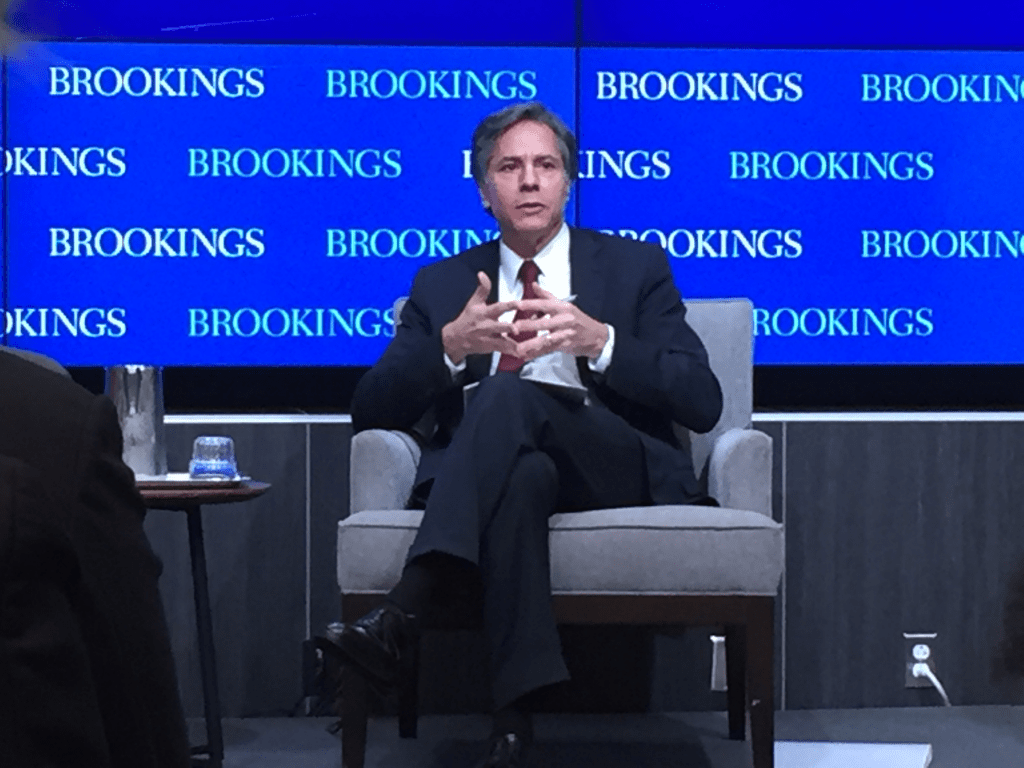
Deputy Secretary of State Tony Blinken said Tuesday at the Brookings Institution that the fight against terrorism won’t be won through combat alone. (Photo: Jack Corrigan/Medill News Service)
WASHINGTON– The State Department’s new multifaceted approach to combating violent extremism takes the fight against the Islamic State and other terrorist groups off the battlefield and into communities where the risk of radicalization is highest.
Deputy Secretary of State Tony Blinken announced the revitalized plan at the Brookings Institution on Tuesday, the day before the anniversary of the White House’s first summit on countering violent extremism.
Blinken, who also served as an assistant and national security expert in the Clinton and Obama administrations, said an improved strategy is needed in the wake of the terror attacks in Paris and San Bernardino, Calif. Both deadly incidents brought attention to new recruitment and organizational tactics used by radical groups to relay their message to people far removed from the battlefield.
“The danger of violent extremism has slipped past the war’s frontlines and into the computers and onto the phones of every citizen in every corner of the world,” Blinken said. “If we’re going to actually win… the fight against violent extremism, it will not be through combat alone.”
A joint strategy, led by the State Department’s renamed Bureau of Counterterrorism and Countering Violent Extremism, and USAID, aims to use non-military tactics to counter violent extremism at its root. The goal is to lessen its appeal to those who are most susceptible to extremist propaganda before it has the chance to radicalize them.
While acknowledging that the nature of extremism varies, Blinken mentioned some commonalities that can breed or accelerate the spread of radical ideology, including feelings of alienation, exposure to violent propaganda, experiences with state-sanctioned violence, heavy-handed security force tactics, and the systematic denial of opportunity.
The plan was first discussed at the White House summit last year, but has since been refined into a few key components.
One major focus is collaboration with international, state and local groups to carry out more effective community engagement programs to prevent the spread of extremism.
“We need local, authentic voices that reject violence as a vehicle to achieve political ends,” Maya Berry, executive director of the Arab American Institute, said in a phone interview after Blinken’s talk. When used in foreign communities where active radical recruitment has been a problem, a grass-roots counter approach empowers mosques and families to directly push back.
Blinken highlighted two important aspects of the new strategy that take similar approaches, using ground-level tactics to fight directly against feelings of alienation and exclusion that can make downtrodden people fall victim to extremism.
First, the plan aims to empower local voices to deliver messages of hope and inclusion directly to the people in a region. Such positive communication strategies would counter extremist propaganda in the community and online, where IS has recently done much of its recruiting.
Additionally, the State Department hopes to strengthen the capabilities of partners in the international community to implement rehabilitation programs for extremist fighters in prisons, which – without intervention – have served as a hotbed for radical messages in many foreign countries.
Two of the Charlie Hebdo attackers, as well as the shooter at the Jewish Museum of Belgium in 2014, were believed to have been radicalized in prison. Putting effective reintegration programs in place could combat efforts by extremist inmates to solicit others to join their cause.
Combatting radicalization in this way serves a double purpose, both weakening recruitment strategies used by the IS, and making general populations less receptive to the radical ideology of whatever extremist group moves in to succeed ISIS.
“We will defeat [IS], I have absolutely no doubt about that,” Blinken said. “But unless we’re able to have a sustained strategy to deal with violent extremism… then [IS] 2.0, whatever it is, will have something to take advantage of.”


